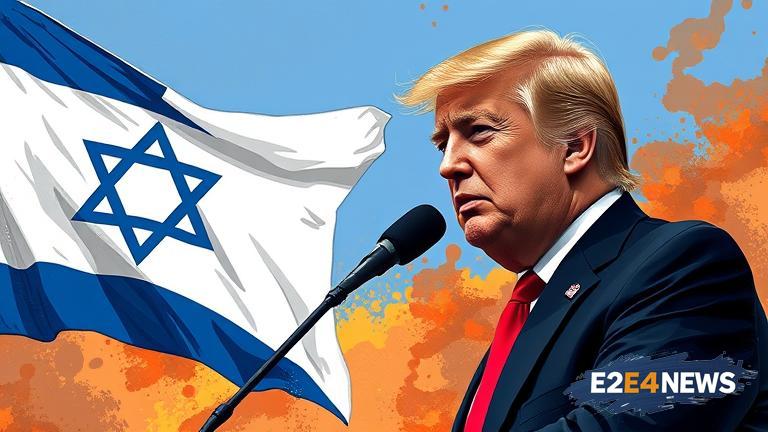The ongoing conflict between Israel and Gaza has been a major concern for the international community, with both sides suffering significant losses. Recently, US President Donald Trump weighed in on the issue, claiming that the conflict could be resolved within three weeks. This statement has sparked a mix of reactions, with some expressing optimism about the possibility of peace, while others remain skeptical. The conflict between Israel and Gaza is a complex and deeply rooted issue, with both sides having competing claims and interests. The region has experienced periodic outbreaks of violence, resulting in significant human suffering and economic losses. Despite numerous attempts at negotiation and mediation, a lasting resolution has yet to be achieved. Trump’s prediction of a swift resolution has raised eyebrows, given the complexity of the issue. However, his administration has been actively engaged in efforts to broker a peace deal, with several high-level meetings and negotiations taking place in recent months. The US President’s claim has been met with caution by Israeli officials, who have emphasized the need for a comprehensive and sustainable solution. Palestinian leaders, on the other hand, have expressed skepticism about Trump’s prediction, citing the need for a more nuanced and inclusive approach to resolving the conflict. The international community has also been watching the situation closely, with many calling for a peaceful resolution to the conflict. The United Nations has been actively involved in efforts to broker a peace deal, with several resolutions and statements calling for an end to the violence. The European Union has also been engaged in diplomatic efforts, with several member states providing significant humanitarian aid to the region. Despite these efforts, the conflict remains a major challenge, with both sides dug in and refusing to compromise. The humanitarian situation in Gaza is particularly dire, with significant shortages of food, water, and medical supplies. The Israeli blockade of the region has exacerbated the situation, with many Palestinians struggling to access basic necessities. The conflict has also had a significant impact on the regional economy, with trade and commerce severely disrupted. In recent weeks, there have been reports of increased violence and tensions, with both sides exchanging rocket fire and airstrikes. The situation remains volatile, with many fearing a further escalation of the conflict. Despite these challenges, there are still hopes for a peaceful resolution, with many citing the need for a comprehensive and inclusive approach to resolving the conflict. A lasting resolution will require significant concessions from both sides, as well as a commitment to peaceful coexistence. The international community will need to play a key role in supporting and facilitating negotiations, with a focus on addressing the underlying causes of the conflict. Ultimately, a peaceful resolution to the Israel-Gaza conflict will require a sustained and collective effort from all parties involved. The US President’s prediction of a swift resolution has added a new layer of complexity to the situation, with many waiting to see if his administration can deliver on its promises. As the situation continues to unfold, one thing is clear: a peaceful resolution to the conflict is essential for the well-being and security of all parties involved. The international community must remain vigilant and committed to supporting a peaceful resolution, with a focus on promoting dialogue, understanding, and cooperation. With the right approach and a commitment to peace, it is possible to envision a future where Israelis and Palestinians can live in peace and prosperity, free from the cycle of violence and conflict. The next few weeks will be critical in determining the trajectory of the conflict, with many hoping that Trump’s prediction of a swift resolution will prove accurate. Only time will tell if the US President’s claim will be borne out, but one thing is certain: the international community must remain committed to supporting a peaceful resolution to the Israel-Gaza conflict.
